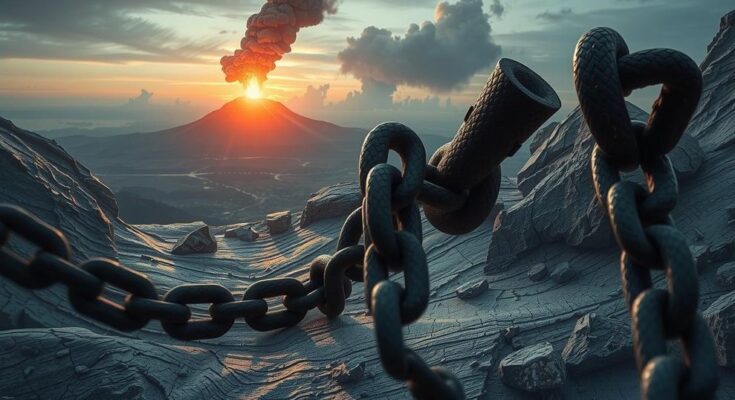The conflict in eastern DRC is escalating with ongoing fighting between the M23 rebel group and the national army, raising international alarms. Recent clashes around Goma have prompted humanitarian crises, displacing hundreds of thousands. Peacekeeping missions are under strain, and calls for immediate action from the African Union and EU emphasize the urgency of protecting civilians and restoring stability in the volatile region.
The conflict in the eastern Democratic Republic of Congo (DRC) is intensifying, with continued clashes between the rebel March 23 Movement (M23) and the DRC army, raising international alarm. Fighting erupted in Masisi territory, close to Goma, North Kivu’s capital, which serves a population of two million and houses numerous NGOs and UN offices. The M23 has threatened to seize Goma following a week of intense confrontations.
International peacekeeping efforts, including those by the United Nations and the Southern African Development Community (SADC), are attempting to assist the Congolese army in countering the M23’s advances. Recently, the M23 and supporting Rwandan forces captured Minova, effectively cutting off Goma’s supply routes. Human Rights Watch’s Clémentine de Montjoye emphasized the need for governments to intervene and safeguard civilians amidst escalating violence.
This week, over 300 individuals have sustained injuries due to the intensifying clashes, as reported by the UN Office for the Coordination of Humanitarian Affairs (OCHA). The situation in Goma is particularly dire, facing critical shortages of drinking water and electricity. The UN Refugee Agency (UNHCR) noted that 400,000 additional people have been displaced in the last three weeks, compounding the crisis affecting over four million already uprooted in the area.
The conflict has claimed the lives of nine South African soldiers and injured several others in encounters with the M23. Reports confirm that seven were part of the SADC mission in the DRC, while additional casualties occurred among Uruguayan and Malawian troops during recent engagements. In response to the rising hostilities, UN peacekeeping forces are temporarily relocating non-essential personnel from Goma to ensure their safety while maintaining essential operations.
The emerging humanitarian crisis has generated significant international concern. Moussa Faki Mahamat, the Chair of the African Union Commission, called for an immediate cessation of hostilities, highlighting the urgent need for international support aimed at alleviating the suffering endured by the affected population. The European Union condemned the M23’s actions as a violation of the 2024 cease-fire agreement, urging Rwanda to cease its alleged support for the group.
Rwandan authorities have denied allegations of collaborating with the M23; however, this alliance has been confirmed by the UN. Furthermore, both Rwanda and the M23 contend that the Congolese army collaborates with the Democratic Forces for the Liberation of Rwanda (FDLR), a claim also validated by UN reports. Following a resumption of hostilities in November 2021, the M23 has progressively advanced, positioning itself once again near Goma, a city previously occupied in 2012.
Since 1998, the eastern DRC has been embroiled in conflict marked by the struggle between rebel factions and national forces, notwithstanding the presence of UN peacekeepers. The ongoing violence continues to exacerbate the humanitarian situation across the region.
The escalating conflict in eastern DRC is deeply rooted in historical tensions and the presence of multiple armed groups. The M23, primarily comprised of Tutsi rebels, emerged as a significant threat to stability in 2012 and has recently regained momentum. The ongoing violence has resulted in widespread human rights abuses and massive displacement of civilians, fostering a severe humanitarian crisis. International peacekeeping efforts aim to stabilize the region, but the effectiveness remains hindered by the complex dynamics involving regional neighbors like Rwanda and the involvement of various militia groups. Humanitarian organizations report alarming conditions for those affected by the violence, with essential resources in short supply. The international community’s response is crucial, as evidenced by calls from leaders like Moussa Faki Mahamat and statements from the European Union, underscoring the need for concerted efforts to promote peace and protect civilians. Despite the presence of international missions, the situation in eastern DRC reflects the broader challenges of insecurity and governance in the region, calling for a renewed focus from global actors on conflict resolution and humanitarian support.
In summary, the ongoing conflict between the M23 and the DRC army in the eastern DRC is escalating, provoking international concern and humanitarian crises. The situation remains volatile, with significant casualties among peacekeeping forces and severe shortages of basic necessities for civilians. Calls from the African Union, the European Union, and various humanitarian organizations highlight the urgent need for immediate intervention to protect the affected populations and restore stability in the region. Continued attention and action from the international community are critical to address these pressing issues effectively.
Original Source: efe.com




